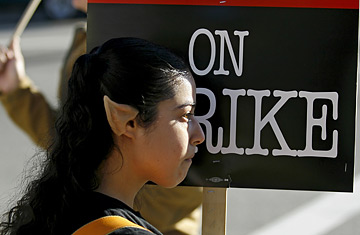
Writers and actors picket in front of Paramount Picture Studios. On December 10, some of the marchers dressed as characters from Star Trek.
There's a new auteur theory making the rounds in Hollywood. This one sees directors as having the best shot at ending the 38-day long writers' strike that has paralyzed the entertainment industry, interrupting production on TV shows like 24 and Grey's Anatomy and movies like Da Vinci Code prequel Angels & Demons and the Johnny Depp drama Shantaram.
After negotiations between the Writers Guild of America (WGA) and the Alliance of Motion Picture and Television Producers (AMPTP) broke down last Friday, the bitterness between the two already rancorous parties reached an all-time high. The producers issued an ultimatum, walked out and released a scathing statement: "While the WGA's organizers can clearly stage rallies, concerts and mock exorcisms," the AMPTP said, "we have serious concerns about whether they're capable of reaching reasonable compromises that are in the best interests of our entire industry." The writers, meanwhile, tried a new labor solidarity tactic — donning Vulcan ears. A Star Trek Day picket line outside Paramount Studios Monday was jolly and well-attended, and writers there showed little sign of a weakening in resolve. "What's the mood in the Guild?" said Star Trek writer Jonathan Fernandez. "We're gonna stay out here until we get a fair deal." Of more than 70 writers asked for this story, picketers and non-picketers alike, only two said they disagree with the strike, one TV writer and one film. Neither wanted to discuss why on the record.
The issue that drove many of the WGA's 12,000 members to support this strike was ensuring payment when their work is used in new media formats like webisodes and iTunes downloads. But considerable energy in the negotiating room has been spent on other issues the parties can't get past, such as whether the WGA should include reality show and animation writers in its membership.
The next group scheduled to start negotiating with the AMPTP, however, doesn't have that kind of baggage. The Director's Guild of America, whose contract expires in June, has a history of resolving its contracts six months early and with little drama. Like the writers, the directors are primarily concerned with reaping benefits from the entertainment industry's increasing reliance on new media. Out of deference to the writers, the directors have held off negotiating so far. But today the DGA issued a statement suggesting they may enter the fray as soon as the New Year. "The situation is dire," says the statement from DGA president Michael Apted and Negotiations Chair Gil Cates. "The WGA-AMPTP impasse has cost the jobs of tens of thousands of entertainment-industry workers, including many of our own members, and more lose their jobs every day the strike continues. With so much at stake and no end to the standoff in sight, we can no longer abdicate our responsibility to our own members." Hollywood unions have a history of piggybacking on each other's contracts. If the directors and the AMPTP are able to agree on a new media compensation formula, the WGA leadership would have a hard time convincing its members to continue the strike for the sake of the other issues on the table.
Pressure could be mounting from other corners in Hollywood as well. Below-the-line workers like grips, costumers and makeup artists have been among the first to feel the pinch of lost income. "I support what the writers want," says Jim Lapidus, who runs the costume department on the Fox show 24, which sacrificed its entire season to the strike. "I don't support the way they did it. I wish they would have stayed at the table and we all would have stayed working." Lapidus's tone is considerably more measured than that of Thomas Short, the president of the below-the-line workers' union, the International Association of Theatrical Stage Employees (IATSE), who likens the WGA leadership to "a huge clown car that's only missing the hats and horns." (IATSE currently represents the reality and animation writers the WGA wants to count as its own).
As Battlestar Galactica creator Ronald D. Moore walked the Paramount picket line Monday, he articulated the view shared by most writers. Moore waged a protracted battle with NBC Universal last year over delivering unpaid, uncredited webisodes of his show. "That taught me the lesson that the studios thought Internet stuff somehow existed in this magical realm where they didn't have to pay anybody and they could do whatever they want," Moore says. "That experience a year ago lead me to believe we were gonna be in this situation today. It's wearying to be in this sort of limbo state. Now all eyes turn to the DGA."
